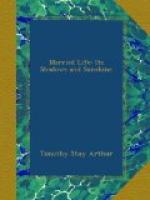“I!” ejaculated the astonished girl.
“Yes. Their two older children died while they were in Louisville, and you, their third child, were born about six months before they left.”
“I!” repeat Kate, in the same surprised tone of voice.
“Yes, dear, you! I have given you a history of your own father and mother. So, as you’re the daughter of a tailor, you must not object to a tailor for a husband, if he be the right kind of a man.”
It may very naturally be supposed that Kate had but little to say against tailors after that, although we are by no means sure that she had any intention of becoming the bride of one.
THE MAIDEN’S CHOICE.
“TWO offers at once! You are truly a favoured maiden, Rose,” said Annette Lewis to her young friend Rose Lilton, in a gay tone. “It is husband or no husband with most of us; but you have a choice between two.”
“And happy shall I be if I have the wisdom to choose rightly,” was the reply of Rose.
“If it were my case, I don’t think that I should have much difficulty in making a choice.”
“Don’t you? Suppose, then, you give me the benefit of your preference.”
“Oh, no, not for the world!” replied Annette, laughing. “I’m afraid you might be jealous of me afterwards.”
“Never fear. I am not of a jealous disposition.”
“No, I won’t commit myself in regard to your lovers. But, if they were mine, I would soon let it be known where my preference lay.”
“Then you won’t assist me in coming to a decision? Surely I am entitled to this act of friendship.”
“If you put it upon that ground, Rose, I do not see how I can refuse.”
“I do put it upon that ground, Annette. And now I ask you, as a friend, to give me your opinion of the two young men, James Hambleton and Marcus Gray, who have seen such wonderful attractions in my humble self as to become suitors for my hand at the same time.”
“Decidedly, then, Rose, I should prefer Marcus Gray.”
“There is about him, certainly, Annette, much to attract a maiden’s eye and to captivate her heart but it has occurred to me that the most glittering surface does not always indicate the purest gold beneath. I remember once to have seen a massive chain, wrought from pure ounces, placed beside another that was far inferior in quality, but with a surface of ten times richer hue. Had I not been told the difference, I would have chosen the latter as in every way more valuable; but when it was explained that one bore the hue of genuine gold, while the other had been coloured by a process known to jewellers, I was struck with the lesson it taught.”
“What lesson, Rose?”
“That the richest substance has not always the most glittering exterior. That real worth, satisfied with the consciousness of interior soundness of principle, assumes few imposing exterior aspects and forms.”




